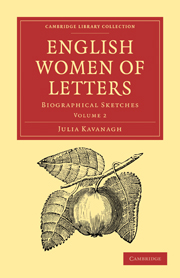Summary
The writings of women are betrayed by their merits as well as by their faults. If weakness and vagueness often characterize them, they also possess when excellent, or simply good, three great redeeming qualities, which have frequently betrayed anonymous female writers. These qualities are: Delicacy, Tenderness, and Sympathy. We do not know if there exists, for instance, a novel of any merit written by a woman, which fails in one of these three attributes. Delicacy is the most common—delicacy in its broadest sense, not in its conventional meaning. Where that fails, which is a rare case, one of the other qualities assuredly steps in. Aphra Behn had no delicacy of intellect or of heart, but she had sympathy. Perhaps only a woman could have written “Oroonoko,” as only another woman could have written “Uncle Tom's Cabin” two hundred years later. Man has the sense of injustice, but woman has essentially pity for suffering and sorrow. Her side is the vanquished side, amongst men or nations, and when she violates that law of her nature she rarely fails to exceed man in cruelty and revenge.
Delicacy was the great attribute of the writer under our notice. Mademoiselle de Scudéry alone equalled Miss Austen in delicacy, with this difference, however, that one applied hers to thought, feeling, and intellectual speculation, and that the other turned hers to the broader and more living field of character and human nature.
- Type
- Chapter
- Information
- English Women of LettersBiographical Sketches, pp. 188 - 236Publisher: Cambridge University PressPrint publication year: 2010First published in: 1863

